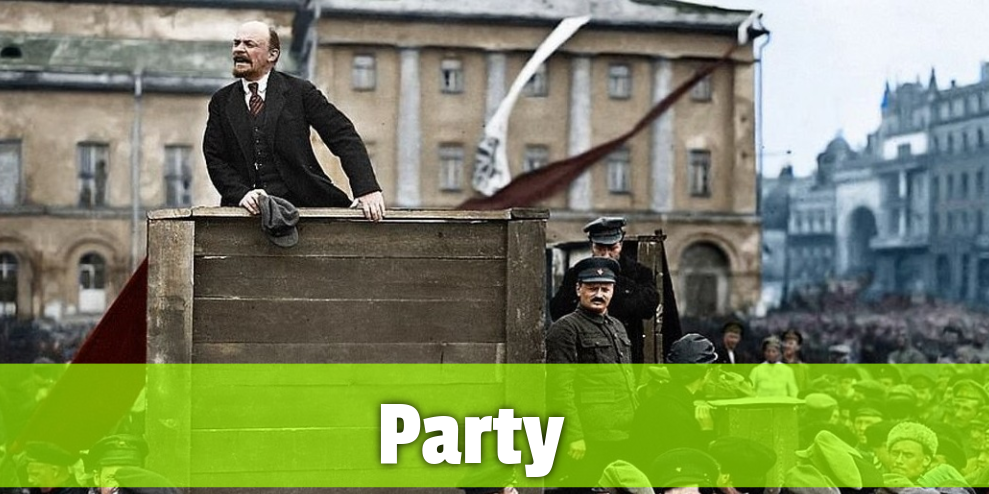Party

The most politically conscious and organized fraction of the working class, which exercises over the working class an effective task of political guidance and direction.
The class as a party in capitalist society
In the first meaning of the term, party means independent political subject: the proletariat is "constituted as a class and, therefore, as a political party", according to the expression of the "Communist Manifesto", when its own struggles, independent from any faction of the bourgeoisie, turn it into an autonomous political subject within capitalist society. This is the fundamental moment in the process of the class constitution of the proletariat.
Party "in the broad historical sense"
The "party in the broad historical sense" is another result of capitalism and the nature of the proletariat, and for this reason it appears permanently, continuously, throughout the history of capitalism without the need to involve a formal organization. By "party" we then refer to the set of networks and environments which express positions reflecting the interests of the workers as a universal class.
Since 1852, then, I have known nothing of ‘party’ in the sense implied in your letter. Whereas you are a poet, I am a critic and for me the experiences of 1849-52 were quite enough. The ‘League’, like the société des saisons in Paris and a hundred other societies, was simply an episode in the history of a party that is everywhere springing up naturally out of the soil of modern society. […]
I have frankly stated my views, with which I trust you are largely in agreement. Moreover, I have tried to dispel the misunderstanding arising out of the impression that by ‘party’ I meant a ‘League’ that expired eight years ago, or an editorial board that was disbanded twelve years ago. By party, I meant the party in the broad historical sense.
Marx to Ferdinand Freiligrath, 29 February 1860
The networks of groups and individuals that sustain such conversations continue to exist even in times of decreased class struggle and affirmation, due to the appearance of individuals, communists, who "learn lessons" from past struggles and engage in the critique of ideology oozing out of the system
When the proletariat does not react, it is only the force through which capitalism reproduces itself by taking advantage of the general apathy of its historical enemy. The working class is then only an amorphous conglomerate of people who manage to survive as best they can in an unbearable society, reproducing the atmosphere of competition and enmity, the unhealthy spirit of capitalism. In a word, it does not act as a class with common interests in the face of capitalist vermin.
At other times, however, the proletariat acts together as a class carrying the only possible human future: communism. Then two kinds of societies can confront each other, one reactionary and the other revolutionary. Between these two factual states and these same facts there are individuals who are revolutionaries regardless of the momentary state in which the class as a whole finds itself, only their number varies according to the social situation. They are revolutionaries because they are aware that their goal and that of the class as a whole is communism.
These revolutionary individuals tend to organize themselves by affinity of ideas, ideas that do not fall from the sky but come from a particular interpretation of the history of the class struggle. Lessons are learned from every confrontation between capital and the proletariat, from which revolutionary theory is born and which drives it forward.
"Revolutionary Organization and Activity, 1979
Class party
The development of that "party in the broad historical sense" in the course of the struggles becomes a relatively large and organized minority of the class. Its ability to centralize itself around a programme and even the most minimal structure will determine whether it can increasingly provide effective political guidance and direction to the workers as a whole. Let us be clear: the party does not "lead" in the manner of a company manager or a football coach, it does not give instructions that workers "must follow". The class party is that more class-conscious part of the class that leads because it provides guidance, because it shows a direction for the movement as a whole to follow.
The emergence of the class party as a minority with the capacity to provide leadership precedes and is necessary for the constitution of the working class as the leading party of society. The emergence of the "class party" is therefore linked to the development of the revolutionary process.
In general, it is to be expected that such party will be articulated around the communist groups that have emerged as part of the "party in the broad historical sense". Although, as the Paris Commune showed and was confirmed in different ways by the Russian Revolution, what characterizes the class party and what is useful to centralization is not so much the particularity of the groups converging together, but their ability to identify the ultimate needs and possibilities of the struggle in their own development.
http://dictionary.marxismo.school/Party